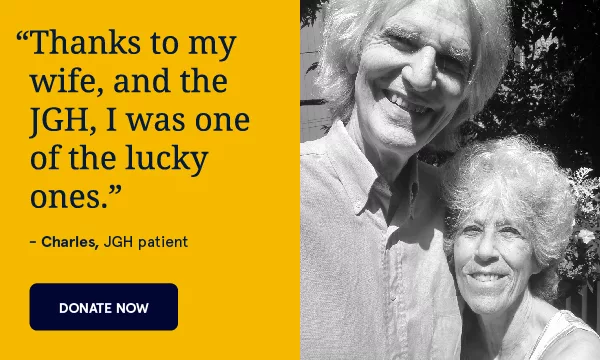
Waking up in the hospital was a disorienting experience for me. I couldn’t remember much – in fact, I recalled almost nothing from a week prior to my hospitalization.
It all started on a typical morning. My wife Dorothy and I got up at 6:30 a.m., drank coffee together, and worked on some sudoku puzzles. Then we exercised and had breakfast. Our plan was to shop at Jean-Talon market with friends and go out for lunch.
As I was getting dressed, my heart stopped. I suffered a cardiac arrest.
Dorothy heard me fall and came running to help. She was terrified when she found me unmoving on the floor and called 911. Responding to the crisis, my courageous 76-year-old wife began to administer CPR. as the 911 dispatcher stayed on the phone. She continued CPR until the first responders arrived. The manual pumping from the CPR forced blood through my veins and ensured my brain got oxygen.
I was brought to the Jewish General Hospital (JGH), where the doctors did an angiogram and put me in a medically induced coma. Since I had been without a heartbeat for 20 minutes, they told Dorothy my chances of neurological recovery were low and not to get her hopes up.
But after four days in the induced coma, I woke up! Thanks to my wife, and my good fortune at being taken to the JGH, I was one of the lucky ones. The survival rate for people suffering out-of-hospital (OOH) cardiac arrest is low, but Dorothy, the first responders and the JGH saved my life.
My patient experience was positive in many ways. The Azrieli Heart Centre’s Cardiovascular Intensive Care Unit is in the new Pavilion K, and the rooms are state-of-the-art. They come with the latest equipment and technologies to ensure patients like me get the best possible care!
For two weeks, I was cared for by exceptional doctors, nurses, nutritionists, physical and occupational therapists, and a social worker. Dorothy and I were amazed and grateful for the kindness, empathy, and knowledge each medical expert displayed.
In the news, you’ll often hear about the failures of our medical system. But on the front lines, thousands of medical personnel go to great lengths to help their patients. That’s what I witnessed in my time at the JGH. Somehow, my stay in the ICU and the Cardiology department felt comforting and positive, even in light of the trauma Dorothy and I had experienced.
Our lives are mostly back to normal. We can do many of the things we did before, but our perspectives have changed. I have learned that while our current system may not be perfect, private donations to the JGH are quickly invested in equipment, technology, staff, and renovations. I saw it myself first-hand.
It’s undeniable – support from donors makes the difference between a GOOD hospital and a GREAT one. Government funding simply is not enough. That’s why, on behalf of my wife and me, I am asking you to please donate to the JGH annual fund.
Thank you for your support. It truly contributes to the exceptional care at the JGH – and makes all the difference to patients like me.
– Charles
Montrealer Johanne Sternthal is a philanthropist with a deep love of the arts. In recent years, she’s directed that passion to help support an institution she cherishes: the Jewish General Hospital (JGH). It’s both her preferred hospital and place of birth. 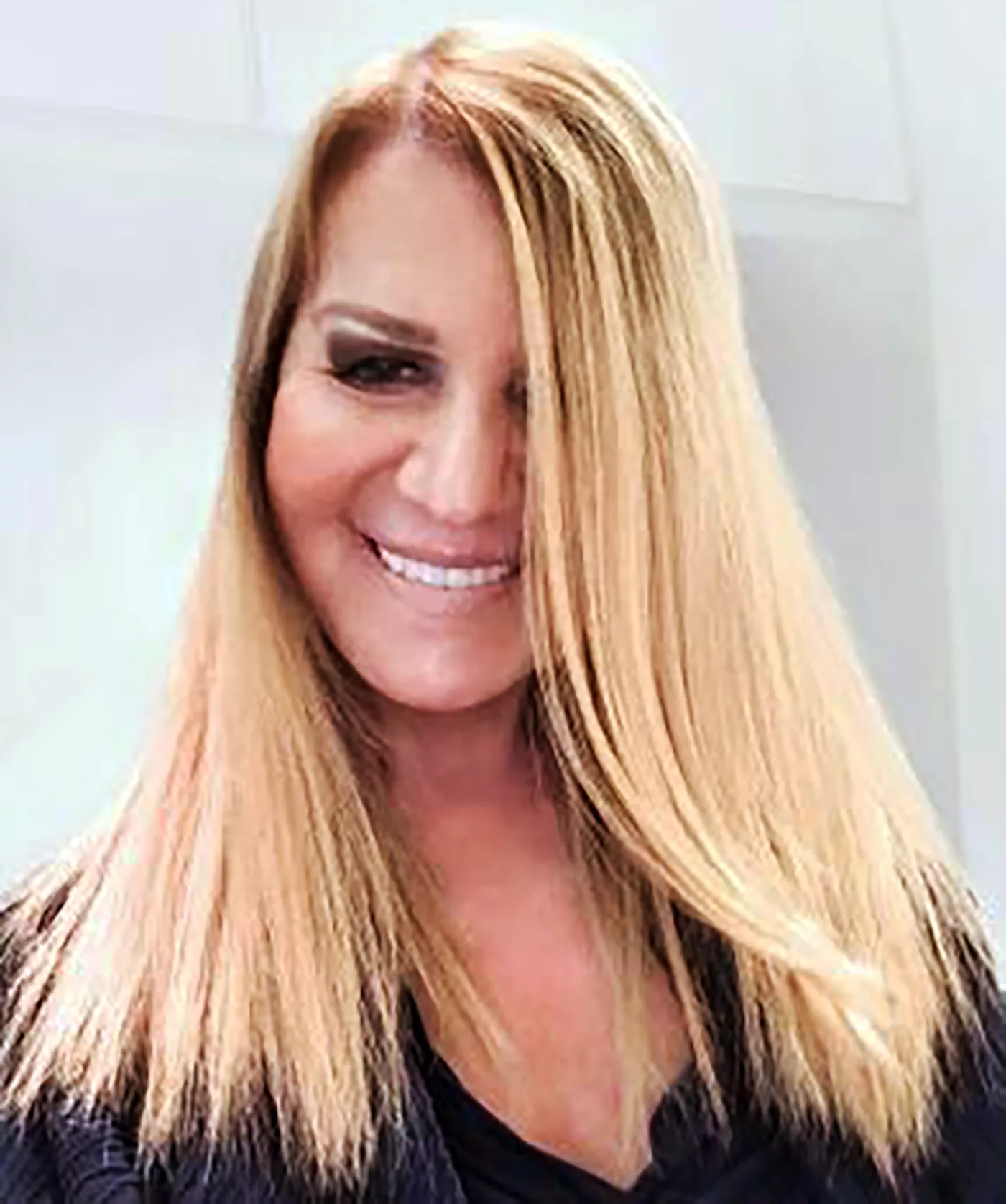
Since 2019, she has helped to raise millions of dollars for the JGH, having been a volunteer artistic director for two successful fundraising events. For her, the cause of supporting the JGH is worth the time and effort of developing her high-octane concepts.
“The JGH is beyond,” she said emphatically. “It has the most incredible doctors and the best service.”
Her start in fundraising for the Hospital came when Dr. Walter Gotlieb, Chief of the JGH Department of Obstetrics and Gynecology, approached the Foundation to ask about creating a fundraiser for the department. The Foundation approached Johanne, whose past fashion shows with their creative visions and choreographies had gotten her noticed.
THE BEAT OF THE STREET
Johanne gladly accepted the challenge and came up with the concept for The Beat of the Street, which was held at Place des Arts in 2019. It was billed as “a non-stop musical production benefiting women’s health services at the JGH’s Department of Obstetrics, Gynecology and Gyn-Oncology”. With over 50 artists, a live band and the inspired sounds of a gospel choir, the performances included classic Motown, R&B and Soul tunes.
“Everything had to be perfect,” Johanne said. “Every little detail in the songs, the dancing, the backdrops. I was going down to rehearsals all the time to make sure I liked the choreography.”
Johanne’s careful attention paid off: the sold-out show enthralled the crowd, who danced in their seats to the music.
The event proceeds were to support advancements in obstetrical care at the Hospital, including world-renowned robotic surgery. Through The Beat of the Street, Johanne helped raise an impressive $1.7 million for the JGH.
LATIN N’ SOUL TAKE MANHATTAN
Her next fundraising event for the JGH, Latin N’ Soul Take Manhattan, had a different musical flavour. It started with a catchy title, which came to Johanne spontaneously as she was walking the halls of the JGH.
“Everything I do has to tell a story,” she explained. “From the name, I get all the ideas of how I’m going to start the show and what songs I’m going to use.”
The concept for Latin N’ Soul Take Manhattan, for example, was a tribute to New York. Since it was being planned and held during the COVID-19 pandemic, the actual experience of this event had to be very different from The Beat of the Street. It was filmed at Place des Arts sans audience in August 2021 and screened to a small, socially distanced live audience, at Cinemas Guzzo a few weeks later. It was also streamed online, allowing it to be viewed from home anywhere in the world, and by JGH patients from their rooms.
More than 20 talented performers came to work their magic, rehearsing for five weeks until the day the cameras rolled. The event was a success, helping to raise close to $2 million towards its wide-ranging cause: women’s health in the JGH’s Departments of Obstetrics, Gynecology and Gyn-Oncology, Cardiology and Psychiatry.
A DEDICATED PHILANTHROPIST
Even as she was leading the concepts for these shows pro bono, Johanne and her husband, Norman, have themselves been outstanding supporters of the JGH. They were lead donors to Mindstrong, a fitness-based fundraising event in support of the JGH’s Department of Psychiatry. They have also supported other departments at the Hospital, including Cardiology, with millions of dollars in donations.
An imaginative visionary, an uninhibited creator, and a dedicated philanthropist – Johanne’s gifts have ultimately supported thousands of patients at the JGH and beyond.
Last Updated May 2023
Join fellow Quebecers for Le Week-end pour combattre le cancer—the only outdoor event benefitting the JGH’s world-renowned Segal Cancer Centre. Together, we will help fuel vital cancer research, exceptional care, and ground-breaking innovation—right here in our own backyard.
The choice is yours—cycle or walk on Sunday, August 20!
In September 2016, Marvin Carsley was shaving when he felt a lump on the side of his throat.
He asked his wife, Philippa, to have a look. When they went to a doctor the next day, their fears were confirmed: a biopsy revealed anaplastic thyroid cancer.
“I looked it up on the internet,” Marvin recalled. “What I discovered was shocking: I was told that only 1% or 2% of people with anaplastic thyroid cancer survive up to six months.”
He knew that if he wanted to survive, he would need to be treated quickly. He was faced with an extremely aggressive, fast-moving cancer and every moment was critical.
He and Philippa searched for a surgeon in Hong Kong, where they were based, but they could not find one who would operate on him.
“They sat me down and told me that there was no real treatment they could offer,” Marvin said.
Something had to be done, because Marvin’s prognosis did not look bright.
Journey to the JGH
A viable treatment was not available in Hong Kong, so Philippa promptly got in touch with the JGH’s Dr. Richard Payne. They knew the JGH well from their ties to Montreal, which is home to much of Marvin’s family.
“I think we can do something,” Dr. Payne told them both after looking at Marvin’s scans. “I’ve studied the images you sent. Dr. Michael Hier can do the lymph nodes, and I will do the thyroid.”
Not only is the JGH close to Marvin’s heart, it’s also a world-class hospital. The JGH’s Segal Cancer Centre offers groundbreaking cancer treatments that raise the bar for patient care. That’s why, after hearing Dr. Payne’s response, the Carsleys were convinced to fly back to Montreal, the city where Marvin was born.
A post-surgery reoccurence
Staff at the JGH knew that Marvin’s situation was mortally urgent, and he was scheduled for the earliest surgery available. Eight hours after going under, Marvin woke up to some of the best news of his life: they had gotten all of the cancer out.
“I had my doubts, after what I heard from other clinics and doctors,” Marvin acknowledged. “But of course, there’s always hope.”
But not long after Marvin’s surgery, his doctors saw evidence of a reoccurrence. He underwent many weeks of radiation therapy combined with chemotherapy. By the end of it, he was utterly exhausted.
“Truthfully, I was very concerned that within three or four months, there would be another reoccurrence,” he said.
Paying it forward
“That’s six years ago now,” he said. “It hasn’t come back.”
Once he had been successfully treated, Marvin donated to the Otolaryngology (ENT) and Head and Neck Surgery department, where he sponsors an incoming medical student every year. 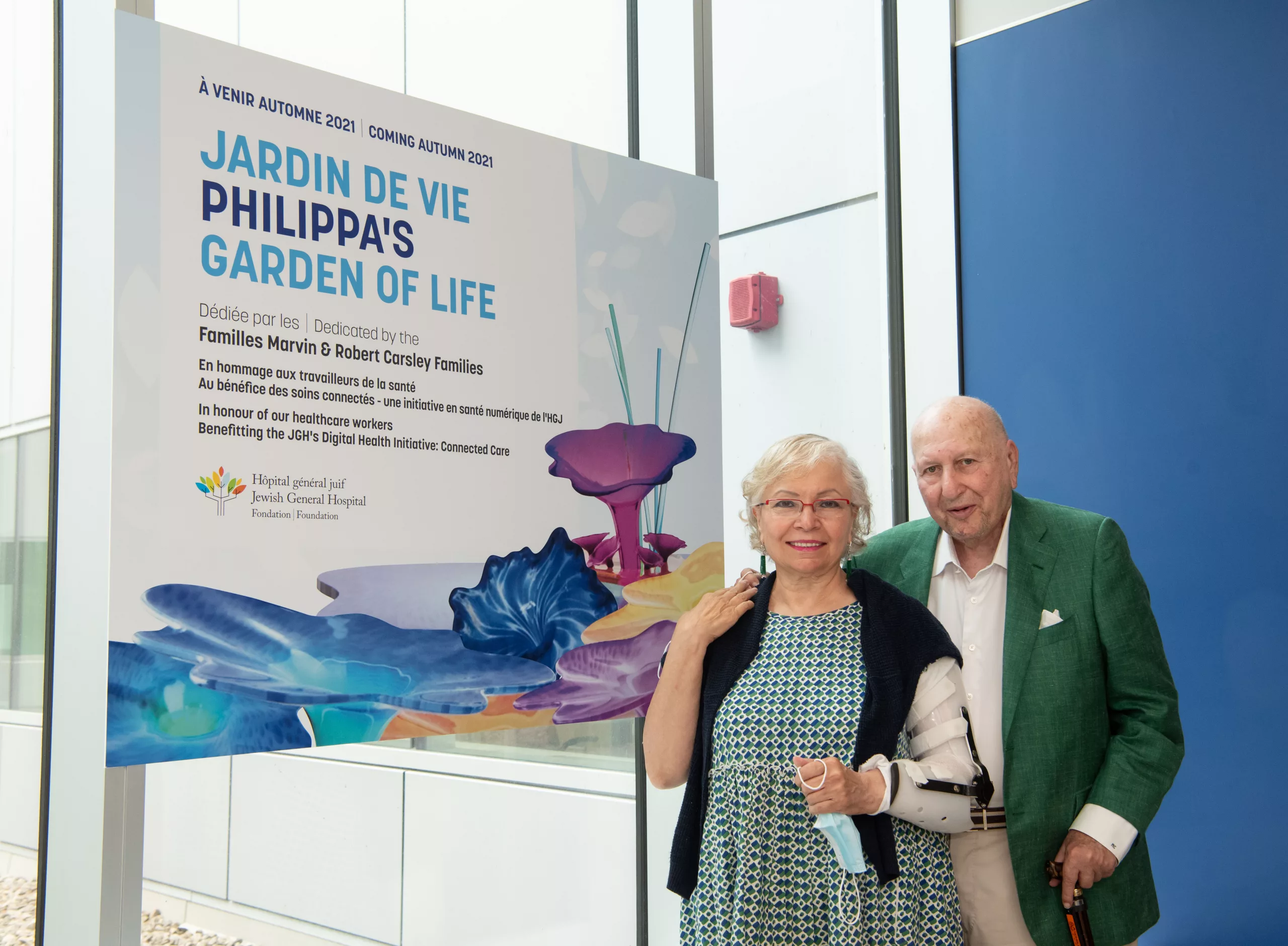
“Philippa and I have been able to do quite a few things for the JGH, but it’s never been enough and it never will be enough,” said Marvin. Gratitude drives his philanthropy.
His wife is the namesake for Philippa’s Garden of Life, a picturesque work of art in the outdoor space next to the Family Waiting Room of the Perioperative Unit, which is named for Marvin and his son Robert. The structure was installed as a fundraising project in support of the JGH’s Digital Health Initiative.
Marvin continues to give generously of his wealth, and not only to the JGH. He never loses sight of his gratitude for life.
“Now here I am, telling you my story,” he said. “I survived, and I’m 86 years old. It’s a miracle.”
Last Updated January 2023
“Because of this equipment, we as radiologists are able to see different types of cancers that we would just not have been able to see had it not been for the equipment.” — Dr. Federico Discepola, Interim Chief, Breast Imaging component of the CRID.
On September 20, 2022 a reception was held at the JGH for the generous donors who supported the acquisition of the Tomosynthesis/Barco equipment at the Marlene & Joel King Breast Referral and Investigation Centre (CRID). This fundraising project was initiated in honour of Dr. André Lisbona, former JGH Chief of Radiology and Director and Founder of the CRID.
Speakers at the event acknowledged what a game-changer the equipment has been for the CRID.
“The technology has led to fewer recalls during breast imaging, therefore decreasing the level of anxiety women felt related to those recalls, and improving their experience of the Breast Centre,” said Dr. Federico Discepola.
Raising funds for the new crid equipment
“Fundraising is not so simple,” Larry Sidel, former JGH Foundation Executive Vice-President who led the fundraising project for the CRID. “But it wasn’t hard to get anybody to come in when it involved Dr. Lisbona. The esteem in which he is held and the love that the community has for him is really remarkable.”
The JGH Foundation’s fundraising team for the CRID ultimately raised over $1 million for the project.
Building one of the best breast centres in Quebec
At the reception, Dr. Lisbona spoke to how grateful he is for the recognition. He also acknowledged the elevated status of the CRID in Quebec.
“The Breast Centre at the JGH is today considered one of the best in Quebec,” he said. “This has not always been the case. We had very humble beginnings. Our equipment was barely adequate. With the help of Marlene and Joel King, Simone and Robert Blatt, the Molson Foundation, and several other supporters and donors, we were able to acquire adequate equipment, and this helped the Breast Centre gain the reputation it has today.”
Our generous donors made it possible!
Last Updated October 2022
“Philanthropy is really important in our family. I felt that given my situation in life – both my age, my experience and the fact that over the last number of years, the business has grown – it has put me in a position now to do something.”
In 2021, Ricky Black and his partner, Sophie Marquis, chose to make a generous gift to the JGH. The gift reflects their desire and means to contribute more to their community, and especially the hospital that has supported them both.
Ricky, who was born at the JGH, knew about the hospital from a young age and several members of his family are strong supporters. In 1936, his grandfather started a metal recycling company in Montreal. His father and uncle started a side business manufacturing metal products called solders, which are used in electronics assembly, and Ricky went into the business 30 years ago.
“Philanthropy is really important in our family,” Ricky explained. “I felt that given my situation in life – both my age, my experience and the fact that over the last number of years, the business has grown – it has put me in a position now to do something.”
For Sophie, the JGH is a particularly obvious choice of beneficiary given recent events in her life.
A MYSTERIOUS CONDITION
Not long ago, Sophie’s now 21-year-old daughter, Catherine, struggled with symptoms of severe fatigue and pain in her neck. When she went for a vascular ultrasound that showed inflammation in her blood vessels, she was rushed to the JGH Emergency Department. Catherine was promptly seen by rheumatologist Dr. Laeora Berkson and they had a long meeting that included Sophie and Ricky.
“From the minute we were there, all the support given to us was incredible,” Sophie said. “When you deal with a situation like that, you really need to be reassured, and that’s what happened.”
She emphasizes how comforting meeting with Dr. Berkson was, particularly given how little they understood Catherine’s condition. Dr. Berkson proposed a series of tests in order to eliminate possibilities.
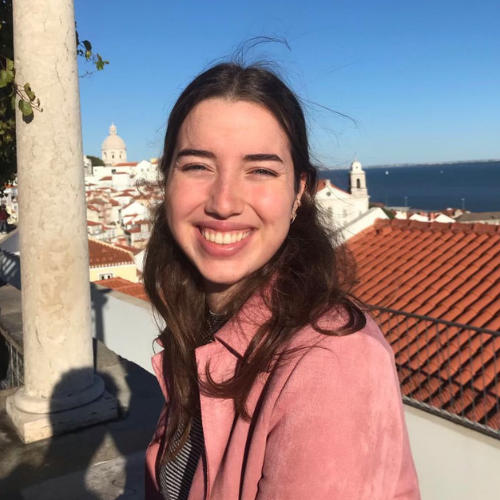
After a rigorous testing period, Dr. Berkson (now the Chief of the Rheumatology Division) and her team found that Catherine’s condition is within a range of maladies very similar to Takayasu’s arteritis, which is a rare group of disorders that causes blood vessel inflammation. Cases can be unique to the individual, and yet there is some commonality across cases. For Catherine, the blood vessels in her neck are inflamed, as opposed to classic Takayasu’s arteritis, which affects the blood vessels near the heart.
The challenge for a rare and complex condition like Catherine’s is finding the right medication to control the inflammation. It’s difficult as some of the medications can have serious side effects that impact the quality of life. Thankfully, since last year, Catherine has been on a new medication that has been going very well. Every month she goes for blood testing. Her quality of life has vastly improved since the time of her Emergency Department visit. She’s studying law and recently even went on an exchange program to Portugal for three months, where she was monitored remotely.
“Thanks to Dr. Berkson, Catherine was able to do that exchange and live the experience of a foreign student and be followed remotely,” Sophie said. “That really gave us peace of mind.”
“It’s a big deal in the life of a 21-year-old to be able to go and do that,” Ricky added. “It’s not just about living. It’s about how you live.”
A DONATION THAT MAKES A DIFFERENCE
The Division of Rheumatology , which primarily addresses disorders of the immune system, treats conditions that include arthritis, disorders of the joints, and osteoporosis. It often does not get as much attention as other departments, which is part of why Ricky and Sophie are giving to this overlooked cause.
“We really wanted to give a hand to the division to help them continue the magnificent work that they do and to help other patients in similar situations,” Sophie said.
One of Dr. Berkson’s plans for the gift is to fund a full-time nurse to provide hands-on care to patients. Going forward, Ricky hopes their transformative donation, which will be disbursed over a ten-year period, will fund research into new treatments for Catherine’s type of condition.
“Part of what we’re giving will hopefully go towards research that will come up with better, less invasive treatments,” Ricky said. “The hope is that, even though it’s a very narrow field and it’s not well-known, better treatments will be forthcoming.”
Both Ricky and Sophie hope to continue giving to the JGH far into the future.
“I know that it’s the right decision,” Ricky said. “I feel really good about it. I’m proud. I’m happy. I’m appreciative. I feel privileged that we’re in a position where we can do this. I hope that we can do more. This is just the beginning.”
Last Updated March 2022
“Go into the world and do well. But more importantly, go into the world and do good.” – Minor Meyers Jr.
Devoted Montreal philanthropists Alan and Roula Rossy are on a mission to make a difference. Through the Alan & Roula Rossy Family Foundation, they have made generous gifts to healthcare, the arts and education over the years.
“Philanthropy is a very important part of our life and we know it will be as important for our children. We believe strongly in leading by example,” say Alan and Roula Rossy.
A COMMITMENT BORN FROM EXPERIENCE
The Rossys long-standing commitment to the JGH was inspired by Alan’s own patient experience. In 2007 he was struck with a life-threatening infectious disease. It was the quick action of the Jewish General Hospital’s medical teams, Alan recalls, that saved his life.
As difficult as it was for the entire family, the experience solidified Alan and Roula’s commitment to supporting the healthcare services. It reminded them of the fragility of life and underscored the invaluable contributions of science and innovation in advancing global health. The Rossys could think of no better way than to give back to the institution that had given them so much.
In consulting with the hospital and the JGH Foundation, they learned how crucial a role the microbiology laboratory plays at the JGH and how direct an impact it has on defining the patient’s diagnosis and course of treatment. Understanding the impact that a fast diagnosis can have on a patient’s outcome, the Rossys committed to help fund the much-needed project of a major renovation and enlargement of the hospital’s microbiology laboratory space, as well as the renewal and upgrade of the laboratory equipment.
“I felt that if I could help someone receive a quicker diagnosis that could save their life, then I’ve done something substantial for the people of my city,” Alan said.
Thanks to Alan and Roula’s generous funding of this microbiology project, the expanded Roula & Alan Rossy Microbiology Laboratory now performs a higher volume of diagnostic evaluations of patients’ fluid and tissue samples, and at a much quicker pace. It’s also thanks to modern and sophisticated equipment sourced from Europe.
Our generous and caring donors raise the bar for the standard of patient care at the JGH, and Alan and Roula are no exception. Thanks to the Rossys’ heartfelt dedication and support, JGH patients now benefit from state-of-the-art technology and equipment that accelerates the processing time of blood and urine tests and biopsies, enabling doctors to take quicker action in defining treatment protocols for their patients. In a setting where treatment delays may mean the difference between life and death, the Rossys’ contribution is literally lifesaving.
As one of several designated clinical laboratories in Montreal that provides lab testing for other institutions as well as the JGH, the Roula & Alan Rossy Microbiology Laboratory fills a critical need in the Montreal medical community and reinforces the JGH’s reputation as a first-class hospital. The impact their gift has made on the Montreal community will be felt for years to come, and the JGH is indebted to the Rossys for their unwavering commitment to improving the health care offered to patients in Montreal, Quebec and beyond.
“We hope that when people see our name on the sign identifying the microbiology laboratory, they remember that government funding isn’t enough to maintain a hospital where excellence thrives – private donations are the distinguishing factor,” said Alan. “We can all make a difference in patient outcomes. We are proud of the improvements that our donations make.”
SUPPORTING MENTAL HEALTH THROUGH FUNDRAISING EVENTS
Alan and Roula are also strong supporters of the JGH’s mental health initiatives to enable a brighter tomorrow for thousands of individuals living with mental illness. As lead sponsors of the annual Foundation event, Mindstrong, which supports the JGH’s Department of Psychiatry, the Rossys have helped raise over $9 million since 2015.
Thanks in part to their contribution to this cause, the JGH has made significant inroads in linking physical and mental health, reducing stigma, and promoting recovery, all in beautifully upgraded facilities. The change from past to present is nothing less than transformational and these new facilities, together with expanded programs, are providing patients who are coping with mental illness with the care and treatment they require.
MOVING FORWARD WITH BUSINESS AS USUAL
For Alan, giving is just part of business as usual and he encourages others to do the same. Grateful for his professional success – Alan is one of the founders of the Canadian retail chain Dollarama – he believes that if we have been blessed with good fortune, it is necessary to pay it forward.
Alan also volunteers his time and expertise as a member of the Foundation’s Board of Directors for the past 14 years. Recently, he was appointed to the Executive Committee, a role he sees as an opportunity to assist the hospital in fundraising, resourcing and attracting and retaining the most competent physicians.
Alan and Roula Rossy are motivated by a deep desire to help the JGH sustain its excellent level of healthcare and allow people to receive the best medical services in the institution.
Last Updated February 2022
“I felt that if I could help someone receive a quicker diagnosis that could save their life, then I’ve done something substantial for the people of my city.”
“I’ve often been to the Jewish General Hospital,” said Richard Schanck in an interview with his wife, Harriet. “Every time I walked in, I’ve seen this fundraising incubator where people leave their spare change. At one point, I said to Harriet that we should bring our change and put it in.”
Richard, a kind-hearted musician, had more coins than he knew what to do with. For years he would empty his pockets of change and store it away in a safe place. Some nights he would come home from his music gigs with as much as $20 or $30 in coins. As time went by, the amount grew dramatically.
The fundraising incubator that he saw in the lobby was placed to support the JGH’s Neonatal Intensive Care Unit (NICU). Part of what made Richard want to give to the NICU was spending Christmas at the JGH and seeing children spending their holidays in the hospital. Richard and Harriet never had children, and the cause tugged at their heartstrings.
They checked with Nadine Saumure, the JGH Foundation’s Principal Director of Primary Gifts, who they knew through their past donations to the JGH Foundation. As it happened, Nadine explained, a $6,300 training program for NICU nurses had only been partially funded: the Neonatal Orientation and Education Program (NOEP).
The NOEP provides clinical education to neonatal nurses. It helps to reduce neonatal risk, increase the efficiency of staff, and promote improved neonatal outcomes. Nurses learn to provide high-risk and vulnerable newborns with consistent, high-quality care. Modules include everything from the respiratory system to lactation support.
There was just one problem: after years and years of accumulation, Richard’s loose change filled up three cloth shopping bags. It was a big task to sort them. Richard gathered some of the coins into plastic rolls, and Nadine took over.
After an impressive five-hour marathon of rolling coins, the total amounted to $1,992. Richard opted to top up his pledge to $2,410 to complete the needed funding for the nurses’ training program.
The donation is much appreciated in the NICU, as government funding does not cover these specialized trainings.
“We need to make sure we are up to date on best practices,” said Chloé Décarie-Drolet, Head Nurse of Neonatology. “We do training and the documents are often expensive, so sometimes it’s difficult to enter everything into our budget.”
“When we value education, it also helps with the retention of staff. Our nurses feel their work makes a difference and they want to stay in a stimulating environment,” she continued.
Putting out a helping hand
As for Richard and Harriet, both experienced adversity in their youth, which is part of what inspires them to give to the JGH Foundation and volunteer at organizations like Dans La Rue.
“There’s something about giving other people a chance. Both Richard and I made bad decisions when we were young and learned how difficult life really is – but we had some help from other people to bring ourselves back up. It’s not easy to do when you don’t have somebody putting out a helping hand, especially when it comes to health,” Harriet said.
To Richard and Harriet, every little bit counts. Thanks to Richard’s generous spare change donation, NICU nurses benefit from the latest training.
“We just wanted to put in our two cents’ worth,” Harriet said with a laugh.
Last Updated January 2022
“There’s something about giving other people a chance. Both Richard and I made bad decisions when we were young and learned how difficult life really is – but we had some help from other people to bring ourselves back up. It’s not easy to do when you don’t have somebody putting out a helping hand, especially when it comes to health,”
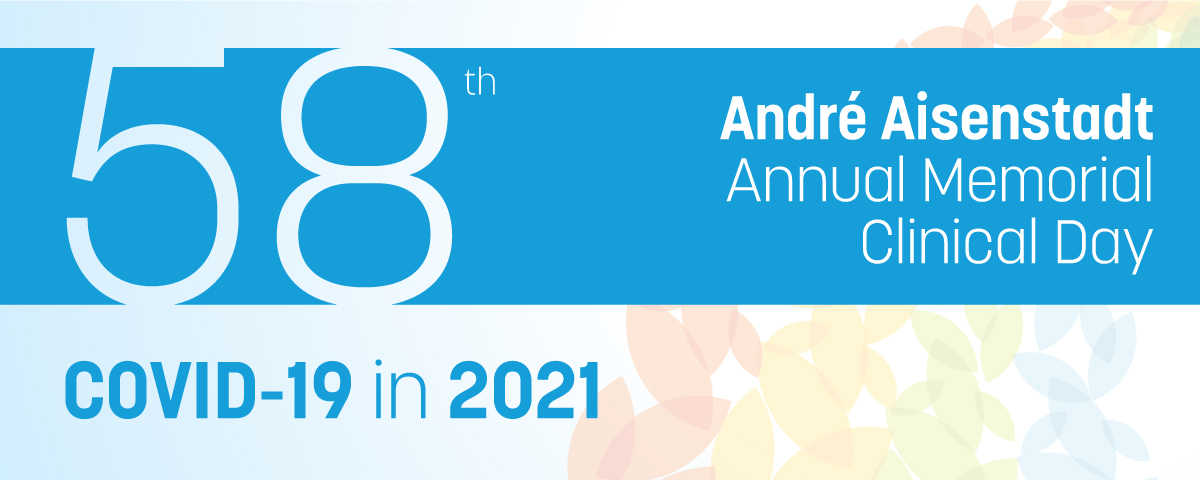
The JGH is excited to present the 58th Annual André Aisenstadt Clinical Day, an expert panel on COVID-19, featuring six renowned experts. This day will include talks on the myriad of topics related to psychiatry, obstetrics, thrombosis, long-term complications of Covid, as well as the historical making of the mRNA vaccines. This event is accredited by the FMSQ and attendees will receive a CME certificate post-event.
Date: October 28, 2021
Time: 8:45 a.m. to 3:30 p.m.
2021 HONOUREES
In departments across the hospital, the personnel responded to the unique challenges posed by COVID-19 with grace and skill. We are pleased to recognize their selfless contributions and demonstrated leadership.
Marc Afilalo, MD, MCFP(EM), CSPQ, FACEP, FRCP
Director, Emergency Department, Jewish General Hospital
Professor and Chair, Department of Emergency Medicine, McGill University
Georges Bendavid, B. Ing, M.Sc
Director of Technical Services, Integrated University Health and Social Services Centre for West-Central Montreal
E. Ruth Chaytor, MD, FRCSC
Associate Professor of Surgery, McGill University
Orthopaedic Foot and Ankle Surgeon & Chief of Surgical Services, Jewish General Hospital
Dr. Justin Cross
Chief Digital Health Officer for the Integrated Health and Social Services University Network for West-Central Montreal
David Diachidos
Chief of Laundry and Linen Services for the Integrated University Health and Social Services Centre for West-Central Montreal and President of the Board of Directors of the CPE Les frimousses for the CCOMTL
Khan Du Dinh
Associate to the Director DRHCAJ- Global security, Integrated University Health and Social Services Centre for West-Central Montreal
Beverly Kravitz
Director of Human Resources, Communications and Legal Affairs for the Integrated University Health and Social Services Centre for West-Central Montreal
Roderick R. McInnes, CM, MD, PhD, FRSC
Alva Chair in Human Genetics
Director Emeritus
Lady Davis Institute
Carmela Pepe, MD, FRCPC
Assistant Professor of Medicine, Division of Pulmonary Diseases
Department of Medicine, Medical Director Covid Units and K7 CTU, Jewish General Hospital
April Shamy, MD, FRCPC
Associate Professor of Medicine, McGill University
Division of Hematology, Department of Medicine, Medical Director Covid Units and K7 CTU, Jewish General Hospital
Roberta Shear, MD, FRCSC
Director of Obstetrics & OBS Ultrasound, Jewish General Hospital
Assistant Program Director, McGill OBGYN Residency Program
Assistant Professor, McGill University
Elliott Silverman, PMP, CRP
Director of Logistics and the Internet of Things, Jewish General Hospital
Lucie Tremblay, inf., M.Sc., Adm.A., CHE, ASC
Director of Nursing, Integrated University Health and Social Services Centre for West-Central Montreal
Anthony Turi
Department Head – Environmental Services, Integrated Health and Social Services University Network for West-Central Montreal
Paul Warshawsky, MD, CM, FRCP(C)
Chief, Adult Critical Care Medicine, Jewish General Hospital
Assistant Professor, Department of Medicine, McGill University
Karl Weiss, MD, MSc, FRCPC
Chief, Division of Infectious Diseases, Jewish General Hospital, Professor of Medicine, McGill University, Department of Medicine
LEARN MORE ABOUT OUR GUEST LECTURERS

EMILIA LIANA FALCONE, MD, PHD, FRCPC
Director, IRCM Post-COVID-19 Research Clinic; Director, Microbiome and Mucosal Defence Research Unit, Institut de recherches cliniques de Montréal (IRCM); Assistant Clinical Professor, Université de Montréal
Dr. Emilia Liana Falcone is the Director of the IRCM Post-COVID-19 research clinic and the Director of the Microbiome and Mucosal Defense Research Unit at the Montreal Clinical Research Institute (IRCM). She is also an Assistant Clinical Professor in the Department of Medicine at Université de Montréal, an Infectious Diseases Specialist at Centre Hospitalier de l’Université de Montréal (CHUM), and holds a Canada Research Chair in the Role of the Microbiome in Primary Immunodeficiency. During the COVID-19 pandemic, Dr. Falcone established the IRCM Post-COVID-19 (IPCO) research clinic, the first clinic of its kind in Montreal. The IPCO research clinic integrates the clinical evaluation of post-acute COVID-19 sequelae with a research protocol (clinicaltrials.gov; NCT04736732) and biobank aimed at understanding the mechanisms underlying the pathogenesis of the post-COVID-19 condition.

DAVID FISMAN, MD
Professor of Epidemiology at the Dalla Lana School of Public Health, University of Toronto, Lead of the Pandemic Readiness Stream at the University of Toronto Institute for Pandemics
Dr. Fisman is a physician-epidemiologist with research interests at the intersection of applied epidemiology, mathematical modeling, and applied health economics. He trained in medicine and epidemiology at Western, McGill, Brown and Harvard Universities, and has held faculty appointments at Drexel, McMaster, Princeton and the University of Toronto, where he is currently Professor of Epidemiology. He currently serves on Ontario’s COVID Science and Modeling tables and holds emergency COVID-19 research funds from Canadian Institutes of Health Research. He leads the Pandemic Readiness stream at the new University of Toronto Institute for Pandemics.

SUSAN KAHN, MD, PHD
Professor of Medicine, McGill University
Dr. Kahn is a clinical epidemiologist and internist based at the Jewish General Hospital, where she is the founder and director of the Centre of Excellence in Thrombosis and Anticoagulation Care. She is appointed as Professor with Tenure and Associate Chair-Research in the Department of Medicine, McGill University. She founded the McGill Thrombosis Fellowship, for which she was Program Director from 2007-2018. She is co-Director of the CIHR-funded CanVECTOR Network, a Canadian national venous thromboembolism research and training network. In 2016, she was elected to Fellowship in the Canadian Academy of Health Sciences, considered one of the highest honors for members of the Canadian health sciences community.

VANESSA POLIQUIN, MD
Associate Professor, Dept. Obstetrics, Gynecology and Reproductive Sciences, Section Head of the Division of Obstetrics, Women’s Hospital, Winnipeg Health Sciences
Dr. Poliquin attended medical school at the University of Western Ontario and completed her residency training in Obstetrics & Gynecology at the University of Manitoba. Following her residency, she pursued a fellowship in Reproductive Infectious Diseases and a Master’s Degree in Epidemiology through the London School of Hygiene and Tropical Medicine. Since completing her training, Dr. Poliquin has provided clinical service in reproductive infectious diseases and is now Section Head of Obstetrics at Women’s Hospital Winnipeg Health Sciences. Dr. Poliquin runs a wet-lab affiliated with the Child Health Research Institute of Manitoba and her primary research program, THRIVE, looks at the vaginal mucosal system in the context of BV, candidiasis and HPV. Dr. Poliquin’s research also involve a number of clinical studies, including the national CANCOVID-Preg collaboration. She has received several accolades, most notably the CMA’s Early Career Leader Award for 2020. Poliquin chairs Manitoba’s Shared Health Provincial Obstetrical Working group as well as the Infectious Diseases Committee for the Society of Obstetrician and Gynaecologists of Canada and wearing these hats, she played a key role in guiding prenatal providers in Canada through the thick of the pandemic.
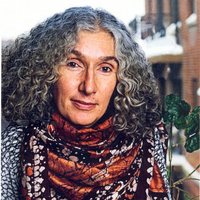
CECILE ROUSSEAU, MD
Professor, Division of Social and Cultural Psychiatry, McGill University
Dr. Cécile Rousseau, MD is professor of the Division of Social and Cultural Psychiatry at McGill University. She received her training in medicine and psychiatry at the University of Sherbrooke, Université de Montreal and McGill. She has worked extensively with immigrant and refugee communities, developing specific school-based interventions and leading policy-oriented research. Presently her research focuses on intervention and prevention programs to address violent radicalization. During the COVID-19 pandemic, she led a wide community intervention program and conducted a number of research projects on the mental health consequences of this context on Canadian communities.

DREW WEISSMAN, MD
Roberts Family Professor in Vaccine Research, Perelman School of Medicine, University of Pennsylvania
Drew Weissman, M.D., Ph.D. is a professor of Medicine at the Perelman School of Medicine, University of Pennsylvania. He received his graduate degrees from Boston University School of Medicine. Dr. Weissman, in collaboration with Dr. Katalin Karikó, discovered the ability of modified nucleosides in RNA to suppress activation of innate immune sensors and increase the translation of mRNA containing certain modified nucleosides. The nucleoside-modified mRNA-lipid nanoparticle vaccine platform Dr. Weissman’s lab created is used in the first 2 approved COVID-19 vaccines by Pfizer/BioNTech and Moderna. They continue to develop other vaccines that induce potent antibody and T cell responses with mRNA–based vaccines. Dr. Weissman’s lab also develops methods to replace genetically deficient proteins, edit the genome, and specifically target cells and organs with mRNA-LNPs, including lung, heart, brain, CD4+ cells, all T cells, and bone marrow stem cells.
RSVP to save your spot for this virtual conference on COVID-19.

From left: Dr. Zoë Thomas, Adult Psychiatry Day Treatment Program and Trauma-Focused Therapy Program, Jewish General Hospital; Edward Wiltzer, Chair, JGH Corporation; Susan Avon, Director and Secretary, Doggone Foundation; Paul R. Marchand, Executive-Director and President, Doggone Foundation; Bill McLellan, Director (deceased); Dr. Karl Looper, Psychiatrist-In-Chief, Jewish General Hospital
Paul Marchand, a catalyst for transformative change via two family foundations
“Pay it back by doing all kinds of good things.” This enduring philosophy has guided Paul R. Marchand throughout his life in both his personal and professional actions, often enabling transformational impact—including at the Jewish General Hospital.
Now retired, he muses that his career in law—he was a partner at Byers Casgrain specializing in tax, estates and trusts—was not a given, “I sort of fell into it.” However, that career became a gateway for doing good which spanned decades, and continues today in his role as executive director for both the Doggone Foundation and the Vodstricil family estate.
“Early on at my first firm, I was fortunate to have had a wonderful, inclusive mentor, Bill Stewart, who looked after estates and trusts. He sadly died very young, and I tried my best to fill his shoes. He believed that happiness was not the result of success but by helping other people. And that would in turn give meaning to the work,” he recalls.
“Therefore, working in the area of estates, I never saw myself as someone who was doing just law. I felt I was helping people with their lives as well as their legacies—and to make a difference.”
Case in point: Elspeth McConnell, the woman behind the Doggone Foundation, which Paul Marchand established on her behalf, and administers. Widowed young, she continued to build a prolific collection of art, much of which was only discovered later in her life when Marchand personally helped her transition to a seniors’ residence. That art—including a Jackson Pollack and other notable works—combined with securities, resulted in an estate worth millions.
Strong-willed, McConnell eventually yielded to Marchand’s influence to use the funds for medical purposes. The choice to invest in the JGH stemmed from her admiration for the Hospital dating back to the 1970s, when her late husband had been treated there—and its inclusion and openness in the area of mental health.
“The Foundation at the Jewish General Hospital, with the guidance of Chief of Psychiatry, Dr. Karl Looper, has been instrumental in building The Elspeth McConnell Mental Health and Wellness Centre, one of the finest of its kind in Canada,” he states.
Stewarded by Marchand, gifts from the Doggone Foundation totalling over $4 million have established the Centre at the JGH, which opened in 2019, among other vital mental health initiatives.
“With the help of the Doggone Foundation, we have established the only publicly available comprehensive therapy program for trauma-focused therapy in Quebec,” shares Dr. Looper, “one which is facing a deluge of referrals reflecting the unmet needs in this area.”
In addition, its Mental Health Day Treatment Centre is a thriving hub for intensive outpatient mental health care—of unprecedented importance during the pandemic. The funding also supports the Centre of Excellence in Geriatric Psychiatry, enabling this JGH department to be “one of the prominent centres for geriatric psychiatry research and training in North America”, states Dr. Looper.
Paul Marchand is noticeably humble when it comes to his involvement in making these projects a reality. “When you have this kind of work, and work with these kinds of fascinating people, you have wonderful stories to tell, and important things to do.”
Another significant gift that Marchand orchestrated stems from the Vodstricil family estate, in which instructions were to leave the funds to the Jewish General Hospital, where one of their sons had been treated, but with no specific designation.
“When I met Mrs. Vodstricil, she was already a widow, and had an interesting story to tell,” he remembers. During WWII, they fortuitously decided to flee Belgrade, and their established life there, just 15 minutes before the Gestapo arrived on their doorstep.
“But I didn’t know when I helped organize her affairs initially, that this would be the result,” he states. In early 2020, when the funds became available to donate, the world was catapulted into an unprecedented time. Marchand explains that the pandemic revealed an opportunity to invest in nurses, particularly important now and for the future.
Most of the $3.5M contribution to the Jewish General Hospital has been dedicated to helping the JGH achieve ‘Magnet Hospital’ status for excellence in nursing and patient care as well as innovation in professional nursing practice—a stringent certification and coveted honour that helps hospitals attract and retain the best nurses and professional staff. It would be the only hospital in Quebec to achieve this designation.
“Nurses and people in healthcare do an extraordinary job, as we have all witnessed during this crisis. They are on the front-lines and should be better rewarded for their tireless efforts and expertise. Their future is all our future,” he shares. “Furthermore, if, through this private funding, I have indirectly helped bring greater public funds into nursing and nurse practitioners, I have done a good thing.”
Paul Marchand’s 80 years have been influenced by remarkable mentors, clients, family and a life lived by the early-learned tenet to pay it forward. And he continues to live true to the words that he learned as a boy attending Lower Canada College: Non Nobis Solum (not for ourselves alone).
“What we do for other people comes from what we give to other people, not what we amass for ourselves. If there is one thing I can suggest, it is to find something that makes use of your talents to help someone every day. You will be happier, have more success and deeper bonds. It sounds simple, but it is true.”
Last Updated August 2021
“What we do for other people comes from what we give to other people, not what we amass for ourselves. If there is one thing I can suggest, it is to find something that makes use of your talents to help someone every day. You will be happier, have more success and deeper bonds. It sounds simple, but it is true.””






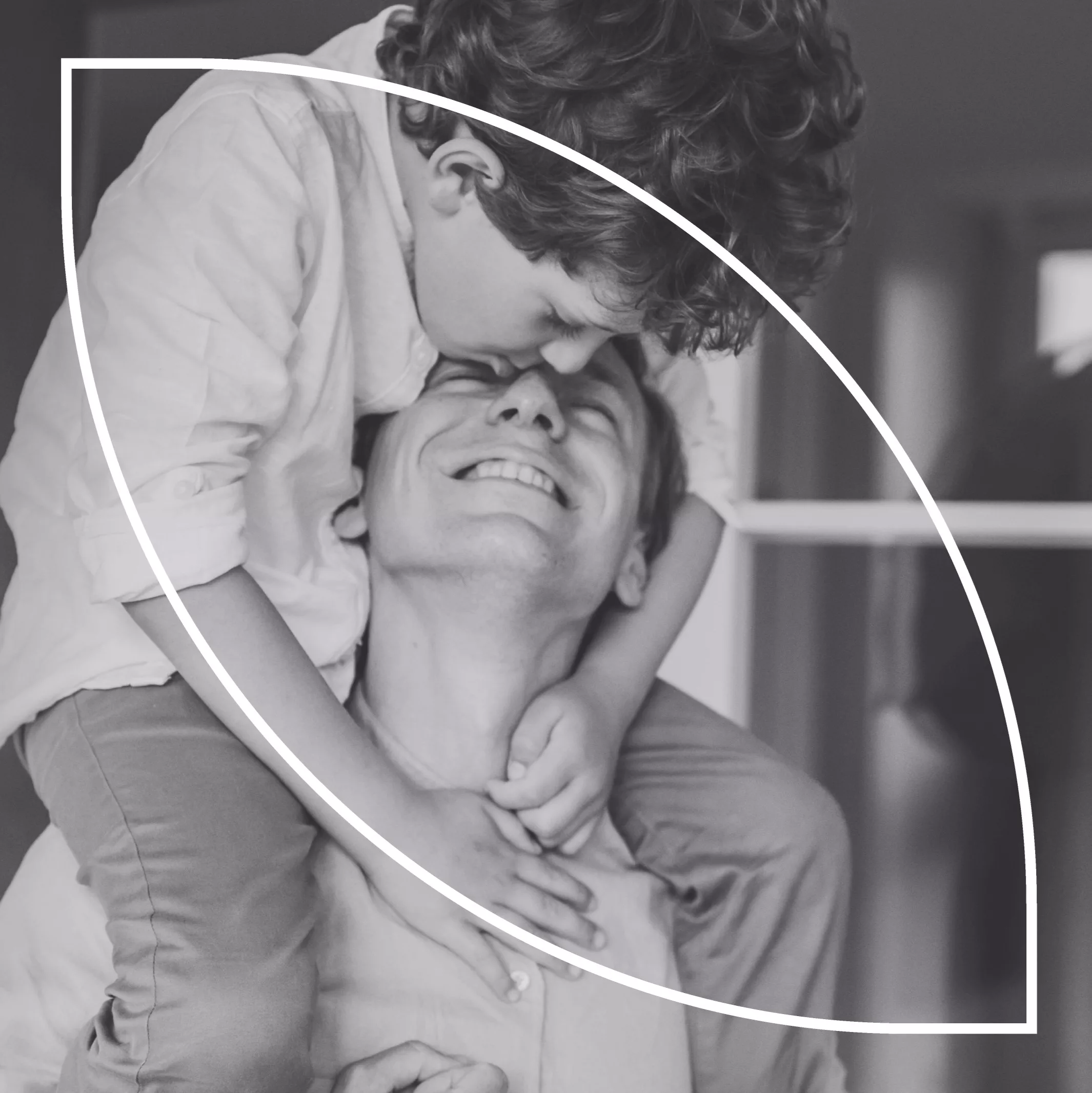 Donors are transforming healthcare at the JGH. We’ll show you how.
Donors are transforming healthcare at the JGH. We’ll show you how.